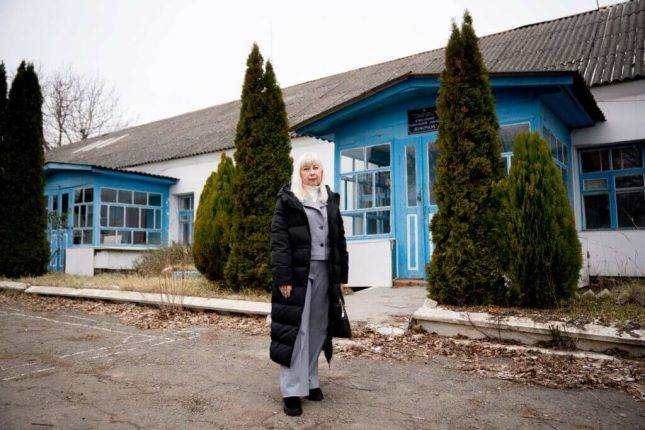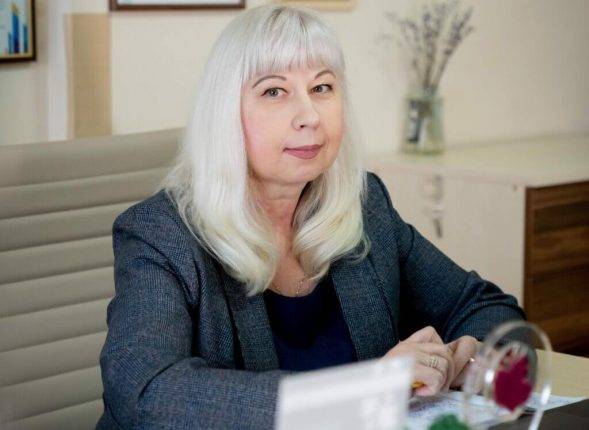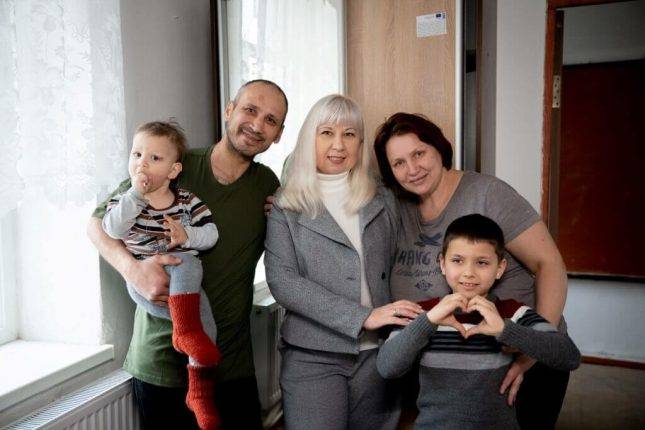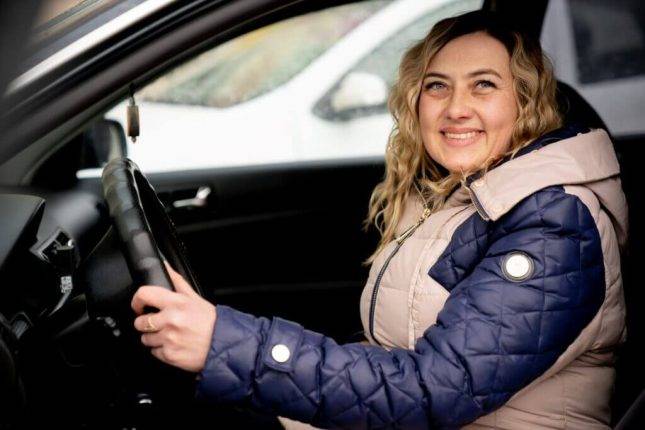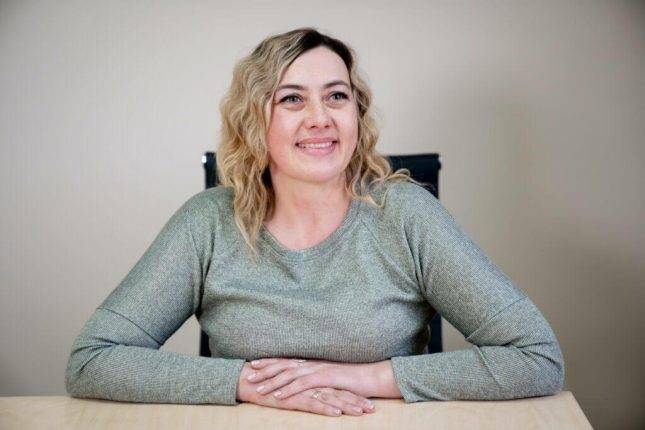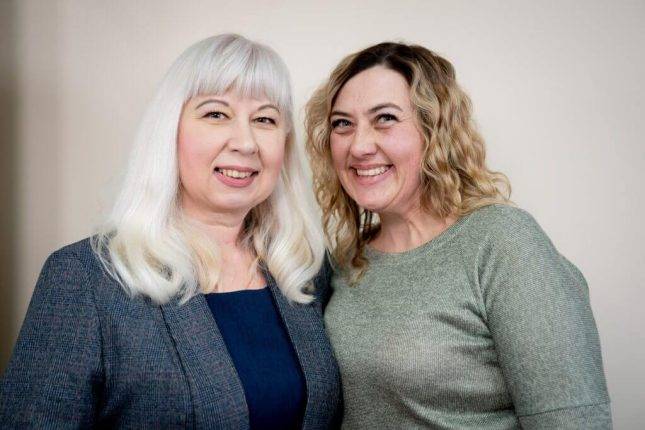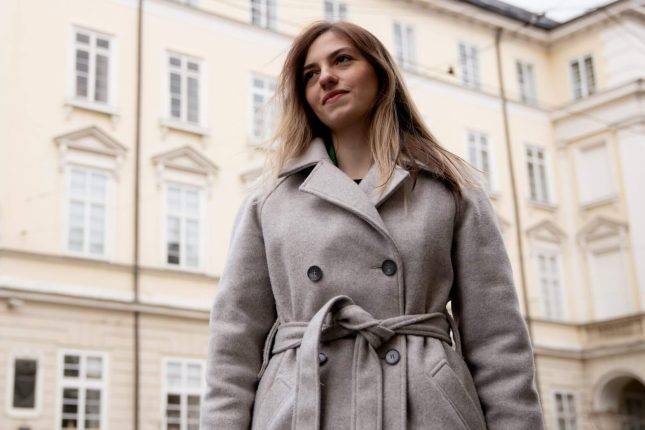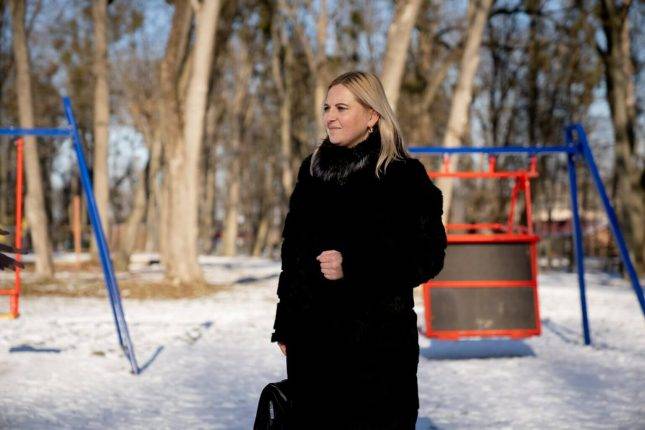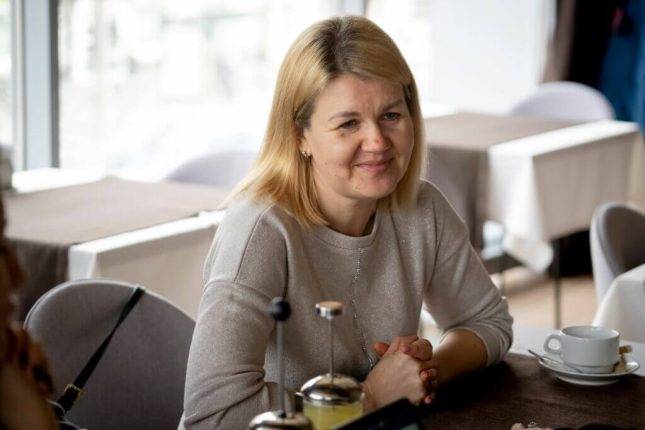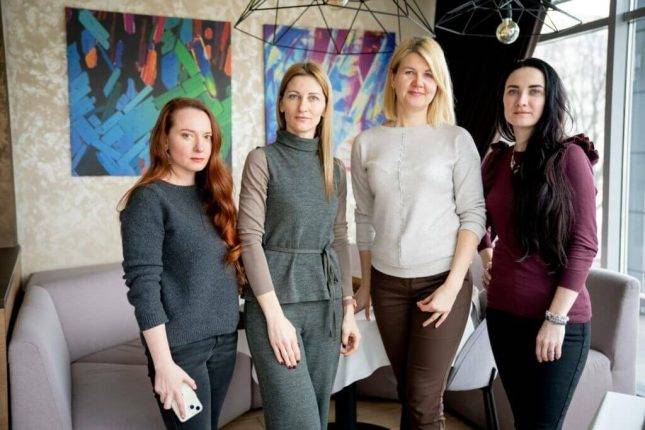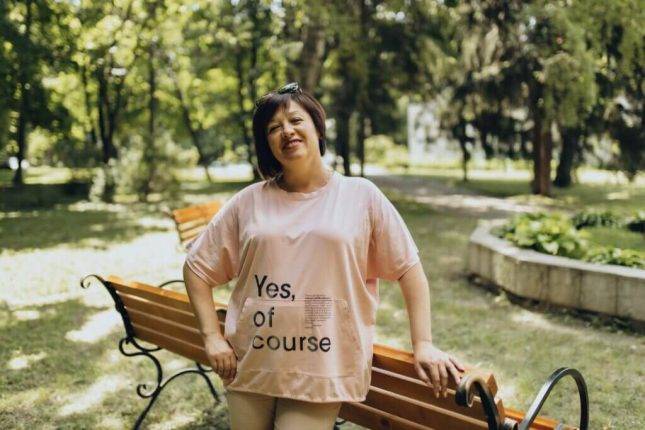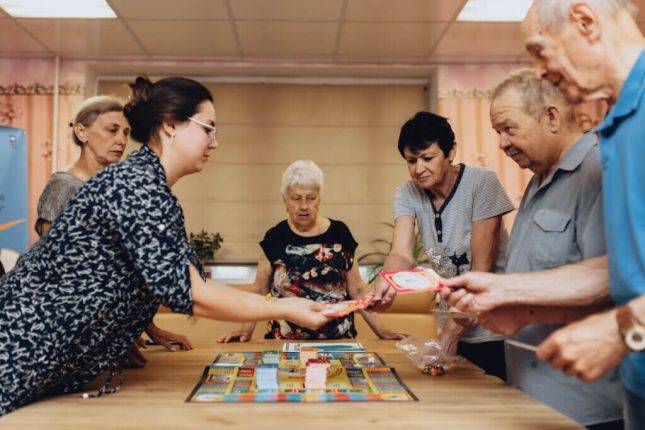
The key is to never give up: how Ukrainian women are building communities and trust in times of war
07/11/2023
Across Ukraine, inspiring women and their NGOs have been creating new initiatives and adapting existing ones to support communities and people affected by the war. With the support of the EU4Dialogue project, funded by the European Union and implemented by the United Nations Development Programme (UNDP), Ukrainian women are building vital community initiatives and leading the forces for change.
‘A woman should not be afraid of difficulties’
Liudmila Ravliuk, 46-year-old leader of the NGO Together for Successful Business, stands as an example of commitment. Her organisation is setting up shelters in the Ladyzhyn community in Vinnytsia Oblast, providing a safe haven for those in need.
The NGO was founded in 2020, focused on assisting small and medium-sized local enterprises with financial reporting. However, since February 24, 2022, their mission has shifted to providing comprehensive support to internally displaced people (IDPs). The onset of war brought drastic changes to their operations.
“These people deliberately stayed in Ukraine and are now adapting to new conditions. They dream of returning and are waiting for their homes to be de-occupied,” says Liudmyla, emphasising the courage and resilience of Ukrainians.
The shelters offer more than just a roof over one’s head; they signify a lifeline for many, a place where they can restore a sense of normality in the face of adversity.
Svitlana Virkun, a volunteer with the NGO, provides psychological support and plays a crucial role in organising events and sorting and distributing humanitarian aid. “I believe a woman should not be afraid of difficulties and be equal to men,” says Svitlana, proudly holding her truck drivers’ licence, a long-standing dream.
After the victory, both Liudmyla and Svitlana dream of rest and travel. “The place where you are now is the best place your guardian angel has chosen for you. I wouldn’t change anything, and I don’t regret anything. Life goes on, and when you regret a step, you live there. But we must live today and move forward,” Svitlana Virkun believes.
‘What could be better than a saved life?’
In 2023, as per the latest data, the Lviv region in Ukraine has become home to over 237,000 internally displaced persons, with more than 68,000 of them being children. It’s within this challenging landscape that the non-governmental organisation Merezha Centriv Edukatsii (Network CE), led by Viktoriia Furhalo and Anastasiia Nechyporenko, has risen to the occasion.
Four years ago, they established an organisation with a mission to introduce systemic non-formal education in Lviv. Little did they know that their efforts would later become instrumental in providing hope and a fresh start for internally displaced persons. The two women and their team are now working hard to transform Lviv’s libraries into informal centres to help IDPs acquire new knowledge and start new professions.
The labour market in Ukraine, like many others around the world, is currently facing a crisis. “Many people are losing their jobs, and many are leaving the country. Non-formal education will help to adapt to these dramatic changes quickly. We can all acquire new professions and social skills,” says Viktoriia Furhalo.
In essence, Network CE is not merely imparting knowledge but also equipping individuals with the tools they need to face the ever-evolving job market and the challenges that lie ahead.
As Viktoriia proudly mentions, “For instance, some people immediately get employed during a design course. There are cases when one person saved another’s life after our first aid courses. What could be better in your work than a saved life? These stories highlight the tangible impact of their efforts, demonstrating that education can be a lifeline, quite literally, for those who need it the most.”
Throughout 2022, Network CE expanded its reach, with nine out of 44 Lviv public libraries now serving as centres for informal education. These libraries have become hubs of hope, where the displaced can learn, connect, and rebuild their lives.
‘It is crucial to work for people with disabilities’
Tetiana Hotsuliak, the co-founder of the NGO Coordinates of the Successful Community in Khmelnytskyi Oblast, used to work with children and youth, organising various events. However, the invasion changed the course of their work dramatically, pushing them to implement projects to support internally displaced persons.
Tetiana recalls the challenges her team faced when launching the main project – a social laundry in the village of Zahrodske and the settlement of Nova Ushytsia. In the summer of 2022, the NGO allocated funds for washing machines, small appliances, and a salary for a staff member to oversee the laundry.
What makes the social laundry truly exceptional is its dedication to accessibility, particularly for people with disabilities. The facilities are equipped not only with wheelchair ramps but also specially designed restrooms and places for rest. Tetiana emphasises, “It is crucial for us to work not only for IDPs but also for people with disabilities,” underlining their commitment to inclusivity and support for all members of the community.
So, what are the coordinates of a successful community? “The key is to never give up,” Tetiana Hotsuliak firmly believes, embodying the resilience and determination of Ukrainian women.
‘The major challenge is to comfort women experiencing a high stress level’
In the heart of Poltava Oblast, a story of resilience and empowerment unfolds through the efforts of the Ukrainian NGO Divergent Woman. Established three years ago, the regional office of this organisation embarked on a mission to combat domestic violence through awareness-raising activities in the Poltava region, visiting 60 communities in 2021. However, the full-scale Russian invasion compelled them to adapt and refocus their work, now directed towards supporting IDPs.
Karina Bulavina, a driving force behind the NGO, experienced at first hand the hardships faced by those who left their homes with the hope of returning shortly, only to see their lives upended. She explains, “I learned first-hand how difficult it is for people who leave hoping to return home in a few weeks. And when this does not happen, they become desperate and do not know what to do. Such a situation can fatally affect their lives.” This first-hand experience inspired her to take action and provide support to those in need.
In April 2022, Karina and her family evacuated to Poltava and were granted IDP status. Despite the challenges she faced, she has been actively involved in building the Kharkiv regional office, expanding the reach of Divergent Woman.
Karina’s colleague, Yulia Karpenko, works as a psychologist and provides counsel to war victims. In addition to her role within the project, Yulia serves as a social worker at a shelter for women who have experienced domestic violence. Her work, while incredibly rewarding, also presents its share of challenges. “The major challenge is to comfort women experiencing a high stress level,” says Yulia, emphasising the critical role that support plays in helping these women to rebuild their lives.
As of the summer of 2023, the Unified Information Database in Poltava Oblast registers more than 208,000 internally displaced persons, with 187,000 of them arriving in the region after February 24, 2022. The work of Divergent Woman has provided essential assistance to over 200 internally displaced women, offering training, psychological support, legal advice, and a crucial assurance that they are not alone in their journey.
‘We wanted to give IDPs a sense of home’
In the same region, but in the village of Khomutets, Tetiana Krasko, the head of the Studio of Public Women’s Initiatives NGO, began her new activities. Her journey, along with many others, led her to college dormitories, which also became a new home for IDPs from Donetsk, Kharkiv, and Luhansk oblasts. However, the path to this new life was not without its challenges.
Tetiana Krasko sheds light on the transformative journey of the displaced individuals. “The IDPs used not even to interact with each other. Everyone was left alone with their thoughts. At first, these people were afraid of making new acquaintances, but later they became friends with each other and the locals.” This evolution from isolation to camaraderie illustrates the resilience of those impacted by conflict and their capacity to rebuild a sense of community.
Local residents and IDPs joined forces to help each other. They concentrated on community building and resilience, organising various events as part of the ‘IDPs as a Resource for Community Development’ project. In the process, they established a shared space for communication within the dormitory, fostering a sense of belonging.
This newfound unity has breathed new life into the community, thanks to improved communication and interaction among various stakeholders, including the college, secondary school, club, church, and the IDPs themselves. Beyond the social interactions, the project has also addressed practical needs. It has provided lighting for the school’s basement, which serves as a shelter during air raid alarms.
“We wanted to integrate IDPs into the local community more fully, to make them feel more secure, to give them a sense of home,” says Oksana Licherep, a project manager who joined the Studio of Public Women’s Initiatives NGO after the full-scale Russian invasion. And this is what brings together all the women and the projects working with the EU and UNDP to support communities affected by the war.
All these projects receive grants and support from the EU and UNDP under the repurposed funds of the regional EU4Dialogue project to address the most urgent needs of war-affected communities in Ukraine. The EU4Dialogue project aims to contribute towards building a durable foundation for peace by creating better socio-economic conditions and improving human security for war-affected communities.
Author: Olga Konsevych
Article published in Ukrainian by Tsn.ua
Stories
-
Katarina Mathernova: If Ukraine had a human face and a human spirit, it would be 10-year-old Roman Oleksiv
-
A regional mission to drive social entrepreneurship: the story of Ksenia Kosukha
-
EU restores safe water supply for 100,000 Ukrainians affected by war
-
Promoting IT during the war: Lviv IT cluster and how EU4Digital helps
-
Frontline digitalisation: Kharkiv IT Cluster collaborations
-
How EU4Youth is driving opportunity and success among young Ukrainians
